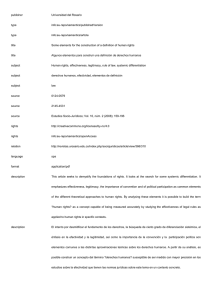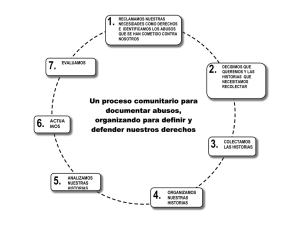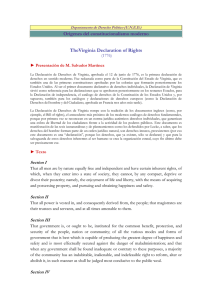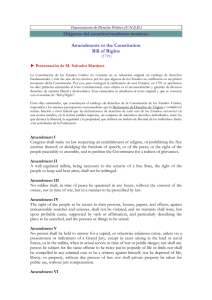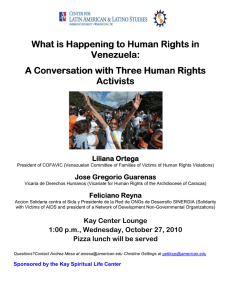Editor`s note: at the time of publication, Bolivia`s constitution had not
Anuncio
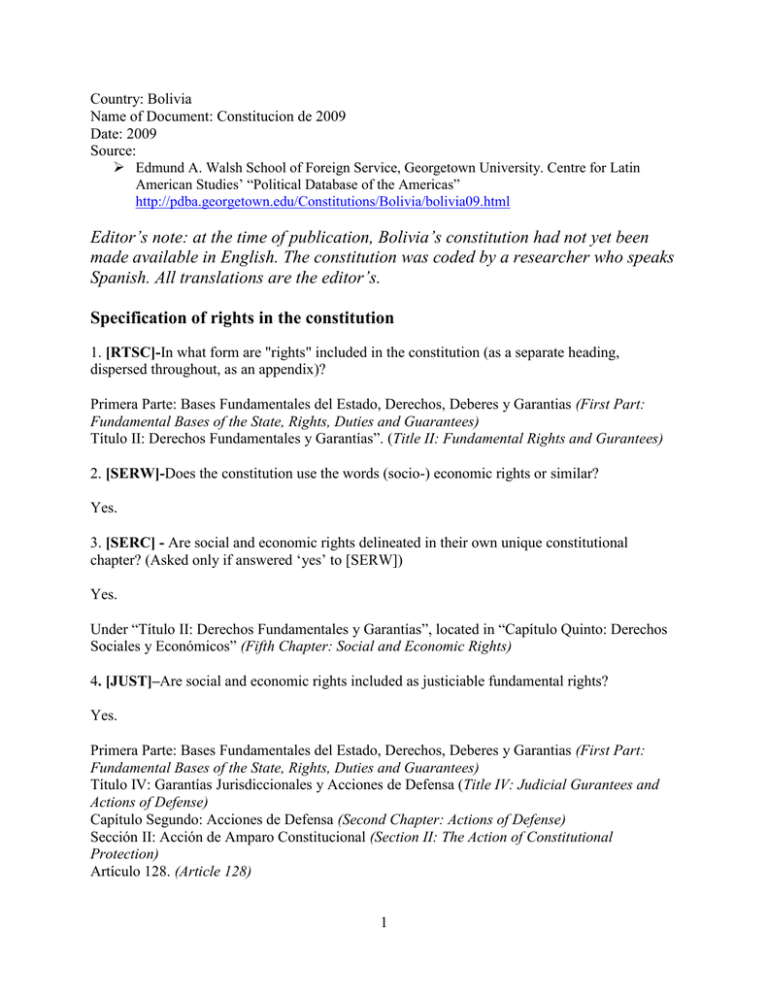
Country: Bolivia Name of Document: Constitucion de 2009 Date: 2009 Source: Edmund A. Walsh School of Foreign Service, Georgetown University. Centre for Latin American Studies’ “Political Database of the Americas” http://pdba.georgetown.edu/Constitutions/Bolivia/bolivia09.html Editor’s note: at the time of publication, Bolivia’s constitution had not yet been made available in English. The constitution was coded by a researcher who speaks Spanish. All translations are the editor’s. Specification of rights in the constitution 1. [RTSC]-In what form are "rights" included in the constitution (as a separate heading, dispersed throughout, as an appendix)? Primera Parte: Bases Fundamentales del Estado, Derechos, Deberes y Garantias (First Part: Fundamental Bases of the State, Rights, Duties and Guarantees) Título II: Derechos Fundamentales y Garantías”. (Title II: Fundamental Rights and Gurantees) 2. [SERW]-Does the constitution use the words (socio-) economic rights or similar? Yes. 3. [SERC] - Are social and economic rights delineated in their own unique constitutional chapter? (Asked only if answered ‘yes’ to [SERW]) Yes. Under “Título II: Derechos Fundamentales y Garantías”, located in “Capítulo Quinto: Derechos Sociales y Económicos” (Fifth Chapter: Social and Economic Rights) 4. [JUST]–Are social and economic rights included as justiciable fundamental rights? Yes. Primera Parte: Bases Fundamentales del Estado, Derechos, Deberes y Garantias (First Part: Fundamental Bases of the State, Rights, Duties and Guarantees) Título IV: Garantías Jurisdiccionales y Acciones de Defensa (Title IV: Judicial Gurantees and Actions of Defense) Capítulo Segundo: Acciones de Defensa (Second Chapter: Actions of Defense) Sección II: Acción de Amparo Constitucional (Section II: The Action of Constitutional Protection) Artículo 128. (Article 128) 1 Artículo 128. La Acción de Amparo Constitucional tendrá lugar contra actos u omisiones ilegales o indebidos de los servidores públicos, o de persona individual o colectiva, que restrinjan, supriman o amenacen restringir o suprimir los derechos reconocidos por la Constitución y la ley. Artículo 129. I. La Acción de Amparo Constitucional se interpondrá por la persona que se crea afectada, por otra a su nombre con poder suficiente o por la autoridad correspondiente de acuerdo con la Constitución, ante cualquier juez o tribunal competente, siempre que no exista otro medio o recurso legal para la protección inmediata de los derechos y garantías restringidos, suprimidos o amenazados. II. La Acción de Amparo Constitucional podrá interponerse en el plazo máximo de seis meses, computable a partir de la comisión de la vulneración alegada o de notificada la última decisión administrativa o judicial. III. La autoridad o persona demandada será citada en la forma prevista para la Acción de Libertad, con el objeto de que preste información y presente, en su caso, los actuados concernientes al hecho denunciado, en el plazo máximo de cuarenta y ocho horas desde la presentación de la Acción. IV. La resolución final se pronunciará en audiencia pública inmediatamente recibida la información de la autoridad o persona demandada y, a falta de ésta, lo hará sobre la base de la prueba que ofrezca la persona accionante. La autoridad judicial examinará la competencia de la servidora pública o del servidor público o de la persona demandada y, en caso de encontrar cierta y efectiva la demanda, concederá el amparo solicitado. La decisión que se pronuncie se elevará, de oficio, en revisión ante el Tribunal Constitucional Plurinacional en el plazo de las veinticuatro horas siguientes a la emisión del fallo. V. La decisión final que conceda la Acción de Amparo Constitucional será ejecutada inmediatamente y sin observación. En caso de resistencia se procederá de acuerdo con lo señalado en la Acción de Libertad. La autoridad judicial que no proceda conforme con lo dispuesto por este artículo, quedará sujeta a las sanciones previstas por la ley. 5. [DPSP]-Are social and economic rights included as directive principles of state policy? No. 6. [DISC] - Does the constitution mention a right to equality or freedom from discrimination? ********************** Free Market 7. [PROP]-Does the constitution provide for a right to own property? Yes – Justiciable (Part I, Title II, Fifth Chapter, Section IV – Derecho a la Propiedad [Right to Property], Article 56). 8. [FMKT]-Does the constitution refer explicitly to a free/competitive market, or use similar language? 2 No. 9. [EXPR]-Can the government expropriate private property under at least some conditions? Yes – Part I, Title II, Fifth Chapter, Section IV – Derecho a la Propiedad [Right to Property], Article 57. 10. What is the specified level of compensation for expropriation of private property? Artículo 57. La expropiación se impondrá por causa de necesidad o utilidad pública, calificada conforme con la ley y previa indemnización justa. La propiedad inmueble urbana no está sujeta a reversión. (Expropriation will be imposed due to necessity or public utility, qualified in conformity with the law and previous, just indemnification. Urban immovable property is not subject to reversion.) 11. Under what conditions or for what purposes can the state expropriate private property? Artículo 57. La expropiación se impondrá por causa de necesidad o utilidad pública, calificada conforme con la ley y previa indemnización justa. La propiedad inmueble urbana no está sujeta a reversión. (Expropriation will be imposed due to necessity or public utility, qualified in conformity with the law and previous, just indemnification. Urban immovable property is not subject to reversion.) Economic Rights 12. [FRWG]-Does the constitution provide the right to just remuneration, fair or equal payment for work? Yes – Justiciable (Part 1, Title II, Fifth Chapter, Section III, Article 46). 13. [TRDU]-Does the constitution provide for the right to form or to join trade unions? Yes – Justiciable (Part 1, Title II, Fifth Chapter, Section III, Article 51). 14. [STRK]-Does the constitution provide for a right to strike? Yes – Justiciable (Part 1, Title II, Fifth Chapter, Section III, Article 53). 15. [LEIS]-Does the constitution provide for a right of rest and leisure? 3 No. 16. [SLIV]-Does the constitution provide for a right to an adequate or reasonable standard of living? Yes – Justiciable (Part 1, Title II, Fifth Chapter, Section III, Article 46). Workers have the right to a wage that guarantees them a “dignified existence”: Artículo 46. I. Toda persona tiene derecho: Al trabajo digno, con seguridad industrial, higiene y salud ocupacional, sin discriminación, y con remuneración o salario justo, equitativo y satisfactorio, que le asegure para sí y su familia una existencia digna. (Every person has the right: to dignified work, with industrial security, higiene and occupational health, without discrimination, and with a just remuneration or wage, equitable and satisfactory, which assures to a person for himself and his family a dignified existence.) 17. [HWRK]-Does the constitution provide a right to a safe or healthy work environment? Yes – Justiciable (Part 1, Title II, Fifth Chapter, Section III, Article 46). 18. [SSEM]-Does the constitution provide a right to social security related to employment? (retirement benefits, sick or maternity leave, unemployment insurance, severance pay, etc.) Yes – Directive (Preamble, e). Social Rights 19. [SSEC]-Does the constitution provide a right to social security not related to employment? (old-age pension, disability, welfare) Yes – Justiciable (Part 1, Title II, Fifth Chapter, Section II, Article 45.) 20. Does the constitution provide for either general or financial support by the government for any of the following groups? 1. Elderly-[FSUP_1] Yes – Justiciable (Part 1, Title II, Fifth Chapter, Section VII) Section dedicated to elderly persons rights. “Derechos de las Personas Adultas Mayores” 2. Unemployed-[FSUP_2] Yes – Justiciable (Part 1, Title II, Fifth Chapter, Section II, Article 45.) Covered by social security rights. 3. Disabled-[FSUP_3] Yes – Justiciable (Part 1, Title II, Fifth Chapter, Section VIII). Section dedicated to persons with disabilities. “Derechos de las Personas con Discapacidad” 4 4. Children, orphans-[FSUP_4] Yes – Justiciable (Part 1, Title II, Fifth Chapter, Section V). Section dedicated to babies’, adolescents’, and young people’s rights. “Derechos de la Ninez, Adolesencia, y Juventud.” 21. [CPRO]-Does the constitution guarantee the rights of children? Yes - Justiciable (Part 1, Title II, Fifth Chapter, Section VII) 22. Does the constitution protect children’s rights to: 1. shelter [CPRO_1] Not specifically. 2. basic nutrition [CPRO_2] Not specifically. 3. social services [CPRO_3] Yes. 4. healthcare services [CPRO_4] Not specifically. 5. family [CPRO_5] Yes. 23. [HLTH]-Does the constitution mention the right to health care? Yes - Justiciable (Part 1, Title II, Second Chapter - “Derechos Fundamentales” [Fundamental Rights], Article 18) 24. [HLFR]-Does the constitution specify that healthcare should be provided by government free of charge? Yes - Justiciable (Part 1, Title II, Second Chapter - “Derechos Fundamentales” [Fundamental Rights], Article 18) 25. [EMER] Does the constitution prohibit the refusal of emergency medical treatment? No. 26. [LAND]-Does the constitution require the state to enable citizens to gain access to land? Yes - Justiciable - Right of indigenous people to own land collectively: Part 1, Title II, Fourth Chapter, Article 30 - Obligation of the state to develop plans to rationally distribute land and natural resources, regulating the market to avoid accumulation thereof, further recognition of indigenous land rights, description of Bolivian Service of Agrarian Reform – Part 2, Title II, Ninth Chapter – “Tierra y Territorio” (Land and Territory) 27. [HOUS]-Does the constitution provide a right to access to adequate housing and/or prohibit arbitrary evictions? Yes - Justiciable (Part 1, Title II, Second Chapter - “Derechos Fundamentales” [Fundamental Rights], Article 19) 5 28. [FOWA]-Does the constitution guarantee access to food and water? Yes - Justiciable (Part 1, Title II, Second Chapter, Article 16, Article 20) 29. [EDUC]-Does the constitution guarantee a right to education? Yes - Justiciable (Part 1, Title II, Second Chapter, Article 17) 30. [DETN]-Does the constitution mention the rights of detained persons? Yes - Justiciable - Part 1, Title II, Second Chapter, Article 22-23 - Part 1, Title II, Fifth Chapter, Section IX: Derechos de las Personas Privadas de Libertad (Rights of Persons Deprived of Liberty) 31. Does the constitution provide detained persons with the right to: 1. adequate nutrition, [DETN_1] Not specifically. 2. adequate accommodation, [DETN_2] Not specifically. 3. medical care [DETN _3] Not specifically. 4. reading material. [DETN _4] Article 73 grants the right to “the opportunity to work and study in penitentiary centers”. 32. [DEVT]-Does the constitution provide a right to development? *********************** 33. [HENV]-Does the constitution specify a right to a safe or healthy environment? Yes - Justiciable (Part 1, Title II, Second Chapter - “Derechos Fundamentales” [Fundamental Rights], Article 19) 34. [ENVP]-Does the constitution require that the state protect the environment? Yes – Justiciable (Part 2, Title II, First Chapter, Article 342) *Amparo applies to “undue or illegal acts or omissions of public servants”, as well as those that “restrict, suppress, or threaten to restrict or suppress rights recognized by the constitution and the law”. Thus amparo seems to apply to “duties of the state” such as those outlined in Part 2. International Treaties 35. Does the constitution mention any international or regional treaties, covenants, or agreements? If so, which ones? 6 None. 36. [INTL] How does the constitution INCORPORATE the provisions of the treaties or instruments to which the state is a signatory? Title II, First Chapter, Article 13 Artículo 13. I. Los derechos reconocidos por esta Constitución son inviolables, universales, interdependientes, indivisibles y progresivos. El Estado tiene el deber de promoverlos, protegerlos y respetarlos. II. Los derechos que proclama esta Constitución no serán entendidos como negación de otros derechos no enunciados. III. La clasificación de los derechos establecida en esta Constitución no determina jerarquía alguna ni superioridad de unos derechos sobre otros. IV. Los tratados y convenios internacionales ratificados por la Asamblea Legislativa Plurinacional, que reconocen los derechos humanos y que prohíben su limitación en los Estados de Excepción prevalecen en el orden interno. Los derechos y deberes consagrados en esta Constitución se interpretarán de conformidad con los Tratados internacionales de derechos humanos ratificados por Bolivia. (IV. The international treaties and agreements ratified by the Plurinational Legislative Assembly, which recognize human rights and prohibit their limitation in Exceptional Situations (Estados de Excepcion) prevail in the internal order. The rights and duties consecrated in this Constitution will be interpreted in conformity with the international human rights Treaties ratified by Bolivia.) 7

